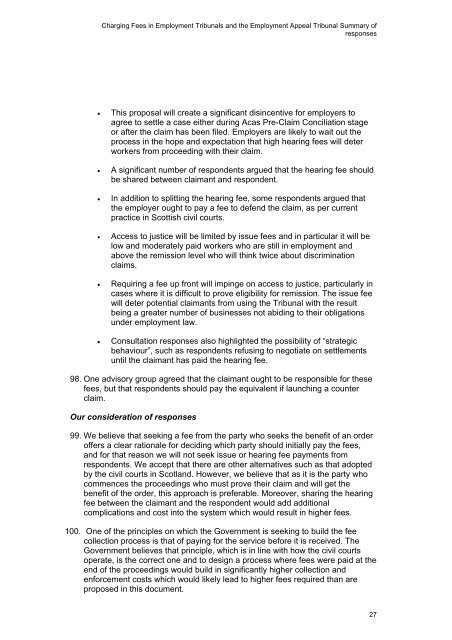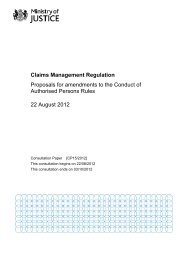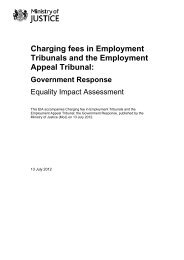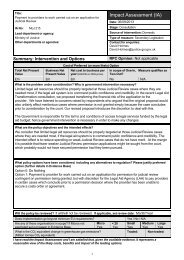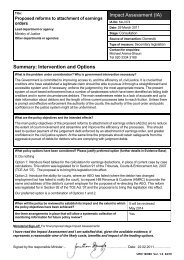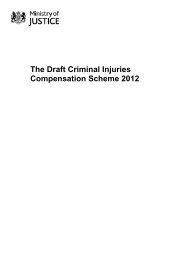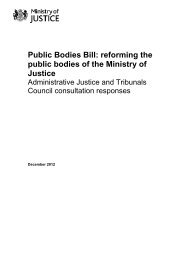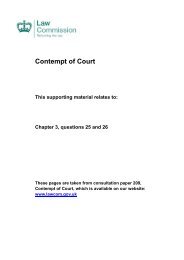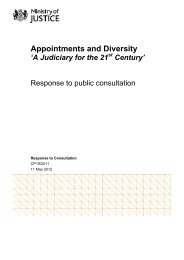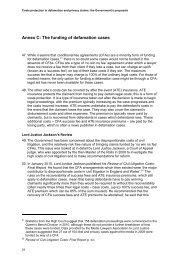Charging Fees in Employment Tribunals and the ... - Ministry of Justice
Charging Fees in Employment Tribunals and the ... - Ministry of Justice
Charging Fees in Employment Tribunals and the ... - Ministry of Justice
Create successful ePaper yourself
Turn your PDF publications into a flip-book with our unique Google optimized e-Paper software.
<strong>Charg<strong>in</strong>g</strong> <strong>Fees</strong> <strong>in</strong> <strong>Employment</strong> <strong>Tribunals</strong> <strong>and</strong> <strong>the</strong> <strong>Employment</strong> Appeal Tribunal Summary <strong>of</strong>responsesThis proposal will create a significant dis<strong>in</strong>centive for employers toagree to settle a case ei<strong>the</strong>r dur<strong>in</strong>g Acas Pre-Claim Conciliation stageor after <strong>the</strong> claim has been filed. Employers are likely to wait out <strong>the</strong>process <strong>in</strong> <strong>the</strong> hope <strong>and</strong> expectation that high hear<strong>in</strong>g fees will deterworkers from proceed<strong>in</strong>g with <strong>the</strong>ir claim.A significant number <strong>of</strong> respondents argued that <strong>the</strong> hear<strong>in</strong>g fee shouldbe shared between claimant <strong>and</strong> respondent.In addition to splitt<strong>in</strong>g <strong>the</strong> hear<strong>in</strong>g fee, some respondents argued that<strong>the</strong> employer ought to pay a fee to defend <strong>the</strong> claim, as per currentpractice <strong>in</strong> Scottish civil courts.Access to justice will be limited by issue fees <strong>and</strong> <strong>in</strong> particular it will below <strong>and</strong> moderately paid workers who are still <strong>in</strong> employment <strong>and</strong>above <strong>the</strong> remission level who will th<strong>in</strong>k twice about discrim<strong>in</strong>ationclaims.Requir<strong>in</strong>g a fee up front will imp<strong>in</strong>ge on access to justice, particularly <strong>in</strong>cases where it is difficult to prove eligibility for remission. The issue feewill deter potential claimants from us<strong>in</strong>g <strong>the</strong> Tribunal with <strong>the</strong> resultbe<strong>in</strong>g a greater number <strong>of</strong> bus<strong>in</strong>esses not abid<strong>in</strong>g to <strong>the</strong>ir obligationsunder employment law.Consultation responses also highlighted <strong>the</strong> possibility <strong>of</strong> “strategicbehaviour”, such as respondents refus<strong>in</strong>g to negotiate on settlementsuntil <strong>the</strong> claimant has paid <strong>the</strong> hear<strong>in</strong>g fee.98. One advisory group agreed that <strong>the</strong> claimant ought to be responsible for <strong>the</strong>sefees, but that respondents should pay <strong>the</strong> equivalent if launch<strong>in</strong>g a counterclaim.Our consideration <strong>of</strong> responses99. We believe that seek<strong>in</strong>g a fee from <strong>the</strong> party who seeks <strong>the</strong> benefit <strong>of</strong> an order<strong>of</strong>fers a clear rationale for decid<strong>in</strong>g which party should <strong>in</strong>itially pay <strong>the</strong> fees,<strong>and</strong> for that reason we will not seek issue or hear<strong>in</strong>g fee payments fromrespondents. We accept that <strong>the</strong>re are o<strong>the</strong>r alternatives such as that adoptedby <strong>the</strong> civil courts <strong>in</strong> Scotl<strong>and</strong>. However, we believe that as it is <strong>the</strong> party whocommences <strong>the</strong> proceed<strong>in</strong>gs who must prove <strong>the</strong>ir claim <strong>and</strong> will get <strong>the</strong>benefit <strong>of</strong> <strong>the</strong> order, this approach is preferable. Moreover, shar<strong>in</strong>g <strong>the</strong> hear<strong>in</strong>gfee between <strong>the</strong> claimant <strong>and</strong> <strong>the</strong> respondent would add additionalcomplications <strong>and</strong> cost <strong>in</strong>to <strong>the</strong> system which would result <strong>in</strong> higher fees.100. One <strong>of</strong> <strong>the</strong> pr<strong>in</strong>ciples on which <strong>the</strong> Government is seek<strong>in</strong>g to build <strong>the</strong> feecollection process is that <strong>of</strong> pay<strong>in</strong>g for <strong>the</strong> service before it is received. TheGovernment believes that pr<strong>in</strong>ciple, which is <strong>in</strong> l<strong>in</strong>e with how <strong>the</strong> civil courtsoperate, is <strong>the</strong> correct one <strong>and</strong> to design a process where fees were paid at <strong>the</strong>end <strong>of</strong> <strong>the</strong> proceed<strong>in</strong>gs would build <strong>in</strong> significantly higher collection <strong>and</strong>enforcement costs which would likely lead to higher fees required than areproposed <strong>in</strong> this document.27


